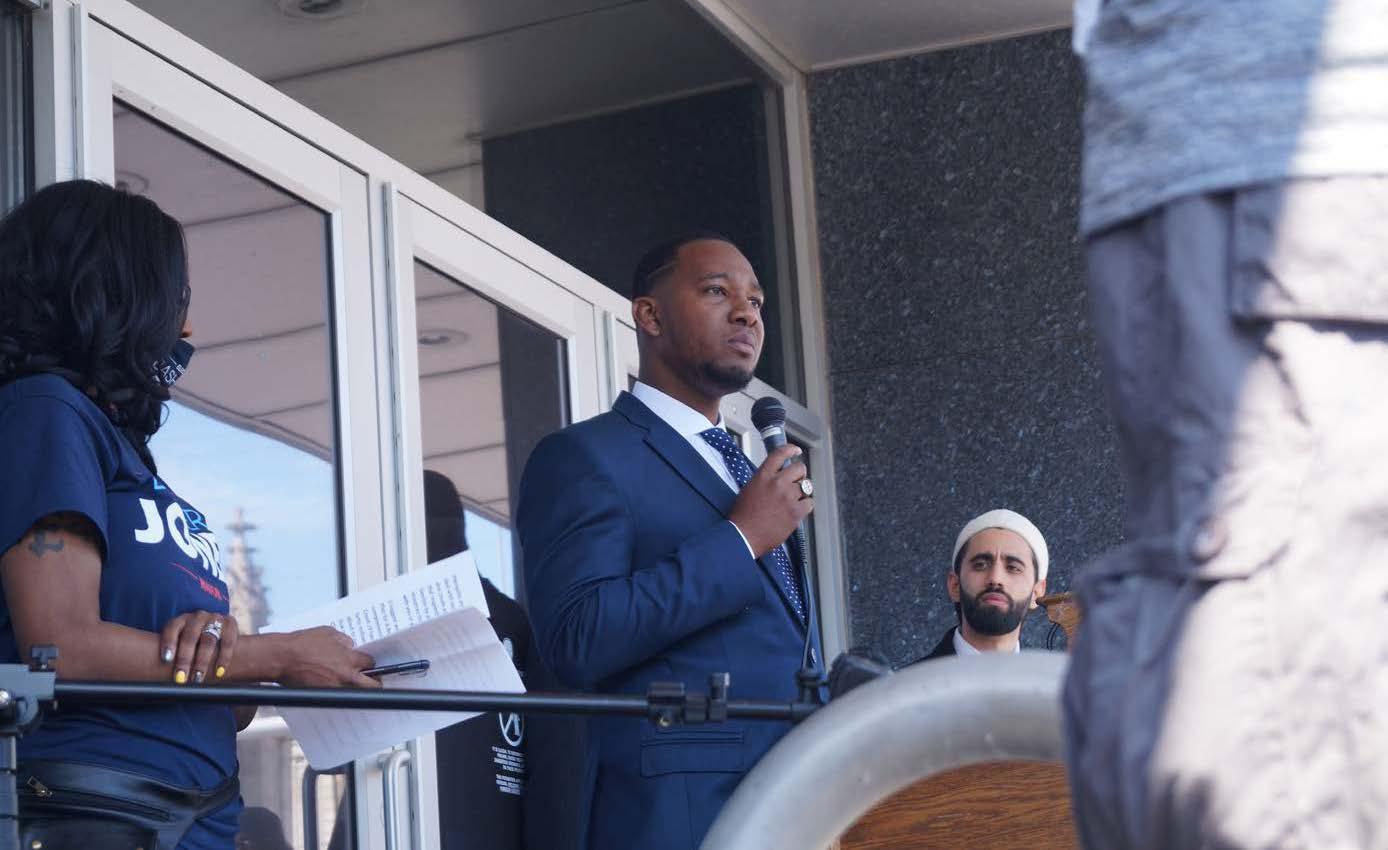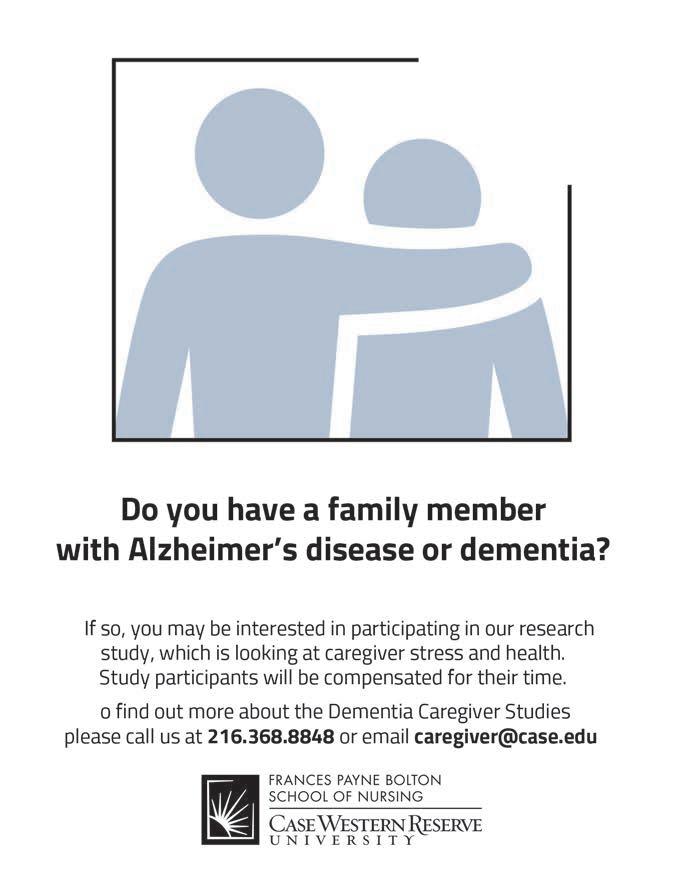
17 minute read
Upfront

UPFRONT UPFRONT
Advertisement



Photo by Sam Allard

COUNCILMAN BASHEER JONES’S LAST DAY AND UNTANGLING THE NEON DEBACLE
SOMETHING BIZARRE HAP-
pened at last week’s marathon committee of the whole meeting at 601 Lakeside. Cleveland City Council was spending the day considering legislation it would likely pass at its evening meeting — this was to be the final meeting of the year, the final meeting at which Council President Kevin Kelley and Mayor Frank Jackson would be in charge — and the agenda was bursting with ordinances, both new and zombified, to be muscled through under the wire.
Early in the day, Michiel Wickers of the city’s community development department and Ebony Webster of the nonprofit Northeast Ohio Neighborhood Health Services (NEON) presented to council on behalf of legislation that would allocate $2 million in federal American Rescue Plan Act (ARPA) dollars to NEON. These funds would provide support for health services on Cleveland’s East Side, things like lead testing, food distribution, and health literacy materials. The funds would also go toward a series of criminal record expungement clinics in conjunction with LegalWorks Inc. and capital repairs at a NEON facility in Hough that had sustained crippling damage in a fire this May.
Cleveland.com reporter Robin Goist wrote in a Sunday A1 Plain Dealer story that Ward 7 Councilman Basheer Jones was making the NEON ordinance his “final legislative push.” Jones ran unsuccessfully for Mayor in 2021, surrendering his council seat in the process, so Monday was to be his final meeting as well.
At the hearing — this was the bizarre part — Jones made a dramatic motion to amend the ordinance. He wanted to double the size of the allocation, from $2 million to $4 million. He said he’d like to create a mechanism where the additional $2 million would be encumbered for NEON but would be set aside in some sort of bucket, and that NEON would have to return to council in two years to seek the second half of its total allocation. Only if NEON lived up to its promises, Jones said, should council give them this extra funding.
Everyone was extremely confused. Kevin Kelley coaxed formal amendment language out of Jones, with an assist from Councilman Charles Slife, but several council people were visibly vexed. Hadn’t a framework for ARPA spending already been established? Wouldn’t this new $2 million for NEON mean $2 million would have to be taken out of something else? Was it even possible to abruptly tack on two million dollars via an amendment at the committee table without any prior warning or discussion? Did the ARPA guidelines even permit such a spending structure? Didn’t this all seem sort of slapdash and untoward?
And come to think of it, weren’t there serious questions about NEON?
Were there ever. Reporting by The Land and cleveland.com in recent weeks had revealed grave financial issues at NEON. The organization was providing fewer and fewer services to fewer and fewer patients and incurring substantial debt in the process. It was reeling from a $1.3 million wrongful termination settlement with the (now deceased) former CFO, after CEO Willie Austin canned him for insubordination when he’d questioned the invoices of one Arthur Fayne, a contractor who was managing NEON’s for-profit subsidiary, the East Side Market. It turns out the former CFO was on to something, as Fayne was later indicted for embezzling nearly $1 million from the East Side Market to pay off gambling debts.
In spite of these scandals and this precarious fiscal situation, NEON’s board saw fit to give Austin a $100,000 raise in 2018. Austin is now paid, per The Land, upwards of $500,000 per year, “more than 20 times what a typical NEON patient makes and $300,000 more than the CEOs of two other [Federally Qualified Healthcare Centers] in Cleveland, Care Alliance and Neighborhood Family Practice.”
Given these concerns, several council people voted no on the amendment. For a tense few moments, it appeared that the motion might not even be seconded. Jones acknowledged the trepidation, but
UPFRONT
stressed NEON’s rich history on the East Side and questioned the media portrayal. “Some of the articles are not completely true at all,” he said, without elaboration. He said that Willie Austin’s salary should not be relevant to the conversation.
Councilwoman Jasmin Santana thought to ask where CEO Willie Austin was. Even if his salary wasn’t up for discussion, shouldn’t he be there answering council’s questions? She asked if she could change her vote on the amendment from YES to NO due to Austin’s absence. Kelley advised that this was not technically possible, but Jones sensed the discomfort in the room and made a motion to withdraw the amendment.
But the same concerns that sparked so much hesitation about enlarging the allocation should have applied to the legislation itself. Was NEON, which has long been a pillar in the community and has provided essential services for 54 years, currently in a position to effectively manage $2 million? Was CEO Willie Austin — whom Jones said was 90 years old and either too frail or too vulnerable to attend the council hearing — still in a position to competently lead? Was the house, strictly speaking, in order? Ebony Webster provided only broad-strokes information about the proposed spending and didn’t have specific details about the insurance coverage for the Hough facility or the progress of the repairs. She did say that the May fire had caused $5 million in damage. (Previous local reporting said that NEON’s Hough Clinic was fully covered by insurance and that the fire had caused “more than a million dollars” in damage.)
All this was the basis of Councilman Mike Polensek’s hesitation. He has a NEON clinic in his ward, but said he was reluctant to pass the ordinance. “I’m torn,” he said. “I want to provide programming to people in need, but I’m concerned about management. I have to pry information out of them. I am extremely disappointed with what happened at the East Side Market. And I don’t even know, quite frankly, that [these funds are] going to be used properly.”
Ward 15 Councilwoman Jenny Spencer indicated that she’d be voting NO at the evening meeting for other reasons. She said she’d have been more inclined to provide funding for the building repairs in Hough, but was opposed to allocating such a substantial sum when other nonprofits across town hadn’t had the opportunity to compete for ARPA dollars as well.
Ultimately, the ordinance passed, but Polensek, Spencer, Charles Slife and Kerry McCormack voted against it.
That didn’t sit well with Jones. In fiery parting remarks Monday evening, he accused his colleagues of not understanding or caring about the plight of Clevelanders in poverty. He said that those who voted against the NEON ordinance were not combating racism, but implementing it.
“It’s not just because you have a bad heart,” he said, “it’s because you’re okay with your lack of understanding... If you are saying that you are going to fight for freedom, justice and equality, then show it not just in front of the cameras, but in the back room when deals are being made.”
Easy for Jones to say, as the deals in question involved millions of ARPA dollars flowing to his ward: not just the NEON allocation, but substantial upfront financing for two housing developments in Hough. The astute and/or cynical observer might have regarded this windfall not as the real-world application of council’s declaration of racism as a public health crisis (Jones’s interpretation), but as the spoils of Jones’s Kevin Kelley mayoral endorsement. Both Monday meetings were certainly awash in Kelley and Jones proclaiming their affection for each other, all while boatloads of federal cash were being funneled to projects for which Jones had personally lobbied. NEON’s presenter, Ebony Webster, was in fact (at least ostensibly) the communications director for Jones’ mayoral campaign.
That’s what was so bothersome, even pernicious, about Jones’s remarks: He used crusading rhetoric about freedom, justice and equality, and accused his colleagues of upholding systemic racism, to defend his pork. And both the kernels of embedded truth and his impassioned delivery lent the speech an air of authority.
Jones’s was the longest in a series of ceremonial sendoffs Monday, and his comments devolved into a diatribe against the local media. Angered by the NEON coverage, Jones said the Cleveland press corps was dominated by suburban journalists who didn’t understand Cleveland issues.
While this was false in part — both Lee Chilcote, who penned the initial investigative piece for The Land, and Robin Goist, who authored the PD/cleveland.com’s coverage, live in the city of Cleveland (Goist even tweeted that she lives in Jones’s ward) — Jones was correct that local media apply far less scrutiny to white institutions than black ones. Where is the critical coverage of the Cleveland Clinic, he wanted to know? And even if reporters do live in the city, it’s true that they are overwhelmingly white. I include Scene and myself when I say that by default, we produce work that aligns with institutions of the state that police and jail black people at rates far in excess of every other industrialized nation in the world. Cleveland is among the hot zones for the miserable social and economic outcomes that these institutions, and those they protect, have wrought.
But it was difficult to disentangle these legitimate criticisms from Jones’ personal agenda. His conclusions were ultimately selfinterested. He said that the press had a responsibility to celebrate the work of local elected officials or else contribute to their trauma (a creative appeal for propaganda), and argued that the ignorant work of local reporters was shaping perceptions of the city, falsely, and producing fear in politicians, preventing them from doing the right thing. (Ha HA!)
The attack on his colleagues was less recognizable as absurd. While the concerns about NEON seemed valid, for example, it’s true that all four council members who voted against the ordinance were white. Were these dissenters, in some sense, implementing systemic racism? Was Jones accurately implicating them for supporting symbolic declarations but being unwilling to put their money where their mouths were?
It’s perhaps not my place to say. But Polensek and Spencer were recently two of only three votes against the Progressive Field Deal, a deal that will provide more than $100 million from scarce city funds to a billionaire team owner. And Jones, for all his bluster, supported a mayoral candidate who bears more responsibility than any single figure in Cleveland over the past decade for maximizing the flow of public resources to wealthy private interests. Is Kelley guilty of implementing systemic racism, by Jones’s definition? Is Jones himself? By supporting Kelley, did he forget the plight of the poor? Does he have a bad heart? Is he okay with his lack of understanding?
On the NEON issue, Jones and many of his colleagues were content to overlook the organization’s recent snafus and allocate funding based on decades of service in some of Cleveland’s poorest and most marginalized communities. Some of the council members had personally been patients at NEON clinics, and they understand the organization’s value. No one made the argument explicitly, but it’d be possible to argue that an influx of public funding could help right a ship no one wants to see sink.
But those who voted NO did not do so because they lack empathy for the poor or for those with criminal backgrounds, as Jones declared. Despite NEON’s history, the dissenters believed there were enough unanswered questions to oppose the ordinance for now. And though no one made the argument explicitly, it’d be possible to argue that it’s irresponsible, bordering on insane, to hand over $2 million to an organization whose financial situation, according to a 2019 audit, “raises substantial doubt about its ability to continue as a going concern.” -Sam Allard

Maple Heights Mayor Annette Blackwell to Run for County Exec
Maple Heights Mayor Annette Blackwell has indicated that she will run for Cuyahoga County Executive in 2022. In a letter to voters published on her newly minted campaign website, Blackwell said that both her political and professional experience have given her the tools to serve.
“All things about the county are local, as it is the office of 59 local communities,” she wrote. “I am prepared to come to this office with a personal knowledge of local government in an executive position; the resources and support that cities need from county government and the full understanding of the collaborations, initiatives and partnerships that must be pursued and formalized to keep cities successful.
“Equally important, I believe, is my ability to connect to the people,” she continued. “In this role it is imperative to create a belief system that government works in the areas of quality of life, equity and justice, affordable housing, education, poverty, violence, senior care and much more.”
Blackwell, a Democrat, was sworn in as mayor of Maple Heights in 2016 after a career in finance that included 16 years at Deloitte and Ryan Global Tax Services. She became both the first woman and first black person to hold the office in Maple Heights, a majority-
minority inner-ring suburb of about 24,000 people on Cleveland’s southeast side.
Scene profiled Blackwell in 2019 and wrote how, under her leadership, Maple Heights was clawing out of $2.7 million in debt and state-designated fiscal emergency. Blackwell’s deliberate winning attitude and creative policy changes, particularly around housing, were helping residents buy homes and build generational wealth. When the Cuyahoga County triennial home appraisals were released in September of this year, Maple Heights had the highest home valuation increase (29%) in the county.
Blackwell will challenge former University Circle Inc. Executive Director Chris Ronayne in the Democratic primary. And while Ronayne has gathered early momentum this fall, local journalist and columnist Richard Andrews believes that Blackwell could be a “formidable” challenger.
“Blackwell has brought order to [Maple Heights’s] finances, built relationships with her peers, and brought new jobs and businesses to the community,” Andrews wrote in a column this weekend. “Much of her strength is in fiscal analysis, something that is sorely needed as we come to the end of the Budish administration.”
As in the Ed FitzGerald vs. Terri Hamilton Brown primary of 2009, Andrews believes that much will depend on the endorsement of the Cuyahoga County Democratic Party, and the potential involvement of party chair (and current congresswoman) Shontel Brown.
The winning Democrat will then square off against Republican Lee Weingart — or another Republican candidate — to compete for the seat being vacated by Armond Budish.
-Sam Allard
Cleveland Reaches $45,000 Settlement With Man Who Sued After Arrest for Getting Groceries During May 2020 Curfew
The city of Cleveland has reached a $45,000 settlement with Mehdi Mollahsani, who filed a federal civil rights lawsuit after being arrested on May 31, 2020 while attempting to retrieve a grocery order while the city was under a curfew following unrest from the George Floyd protest earlier that day.
The curfew zones and times were almost immediately criticized as over-broad overreactions for which the city provided little to no justification but nevertheless included militarized officers and blocked highway exits.
Regardless, in accordance with the order, residents who lived downtown were asked to remain at home except for work purposes or to gather essential items.
Mollahasani says in his lawsuit that he did just that — leaving his residence on East 9th to retrieve an Instacart order from a delivery driver who had been stopped by cops outside the restricted downtown zone. Before making it four blocks, he was confronted by Cleveland police officers who “harassed him, and baselessly accused him of looting.”
Mollahasani hadn’t even attended
DIGIT WIDGET
$50
Fine levied by the Ohio Elections Commission against the Council Leadership Fund, which it ruled was in violation of campaign finance laws when it donated more than the maximum in monetary and inkind contributions to Ward 12 candidate Anthony Brancatelli.
50
Signatures required to appear on the ballot in the race for Cuyahoga County Executive.
$550,000
Cuyahoga County settlement with former budget director and whistleblower Maggie Keenan, who was fired in 2019 after raising concerns about the county jail and a number of budgetary concerns.
$45,000
City of Cleveland settlement with Mehdi Mollahsani, who filed a federal civil rights lawsuit after being arrested on May 31, 2020 while attempting to retrieve a grocery order while the city was under a curfew following unrest from the George Floyd protest earlier that day.
clevescene.com






UPFRONT
the protest the previous day, let alone participated in any looting.
Despite showing proof of residency, and despite doing nothing more extraordinary than getting groceries and providing proof of the awaiting Instacart driver, police arrested him. One said he “looked like” a looter. He spent two days in jail and the charges were later dropped.
“There was no basis for arresting him,” Terry Gilbert, one of the man’s lawyers, told Cleveland.com. “The police could have accommodated him. But they put him in jail instead. It was typical of the aggressive nature of officers that day.”
Other lawsuits over curfew arrests have been filed, including one by Anthony Body of the Bail Project.
Body, who both lives and works downtown, was cited twice by Cleveland police during the curfew, once while biking over the DetroitSuperior bridge back into downtown after grabbing lunch, and again later that day while biking from his residence to the Justice Center, where he works. He was arrested after the second citation and spent the night in jail. – Vince Grzegorek
OP-ED: Dear Justin Bibb, Cleveland Needs a New Safety Director
Dear Justin Bibb,
It is an exciting time to be a Clevelander since you were overwhelmingly chosen as the mayor-elect by voters. As people who have been at the front line of advocacy for change, we are hopeful as we watch the city’s grassroots activists coalesce around you. Your recent advertisement for recruiting talent nationwide to key cabinet positions instead of automatically rewarding loyal patrons is refreshing. We did however notice that one of the most vital positions, director of public safety, was not posted. This is the subject of our appeal to you. The safety directors position must also be opened up to fresh, qualified leadership.
Despite rumors about how and why he was appointed, Cleveland was excited about Karrie Howard, another leader who promised change. He made bold promises for change and people were cautiously excited about what the future might bring. His actions and behaviors since that time, however, have betrayed his promises to the public. For many like us who have watched Karrie closely, it is evident he does not fit into your vision for a transparent and just city hall that is responsive to citizens’ needs. There are rumors that he may be retained in the new administration. He cannot be.
Yes, Karrie has grabbed headlines for firing police officers, but that should not be the metric that defines his performance. After all, it’s his job to do so when warranted. His increased discipline of officers is a direct result of the Monitoring Team’s scathing report about the leniency of his predecessor, Mike McGrath. It is not bold or courageous to do what policy has always required a person in that position to do.
In the meantime, Karrie has burned many bridges with community activists and organizations, particularly when it comes to his campaign of open opposition to Issue 24. He has also openly resisted sharing documents with the current police commission and the public related to high profile incidents such as the Arthur Keith and Tamia Chappman homicide investigations. Under Karrie’s leadership there has been almost no criminal accountability for officers who were fired for serious civil rights violations or for police commanders who, according to civil court records, are engaging in behavior that is disparate to the city’s code of conduct. Out of 232 possible cases in 2020, Karrie was only able to get 16 accepted by prosecutors. This is less than 10%. Speaking of dismal percentages, the homicide and sex crime solve rates under his leadership as executive head of the Cleveland Division of police are just as dismal.
Mayor-elect Bibb, your vision for safety in our neighborhoods, transparency and integrity in City Hall, and accountability in policing cannot be achieved unless you wipe the slate clean regarding public safety leadership. Selecting a new safety director who can build trust in the community and bring true innovative and courageous ideas to the office is the best way to move forward. -Brenda Bickerstaff, Samaria
Rice, Alicia Kirkman, Black Lives Matter Cleveland
scene@clevescene.com @clevelandscene








